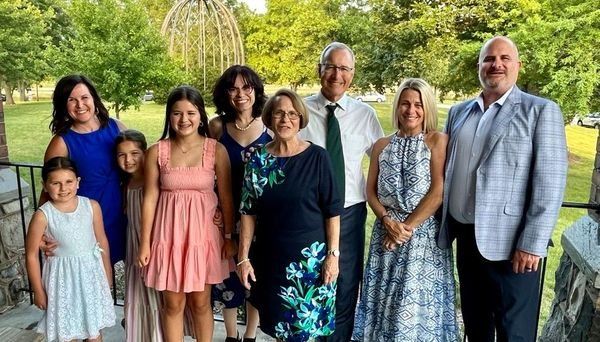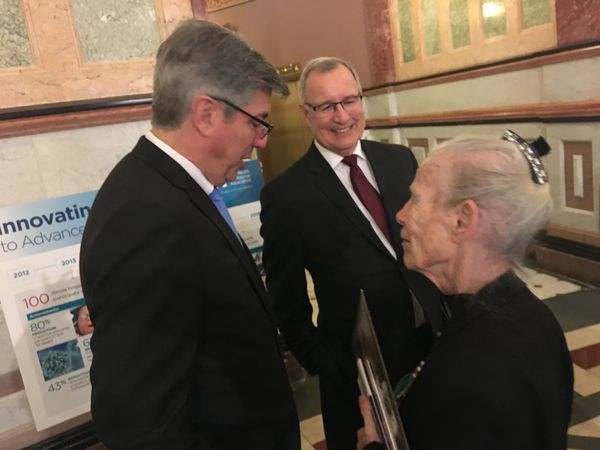IL Corn Celebrates Rich Clemmons’s Contributions to Agriculture

Rich Clemmons spent the beginning and end of his career cleaning up messes.
A job as a night janitor for the Illinois Agricultural Association led to decades of work as a lobbyist representing agriculture. Clemmons announced his retirement for the end of 2023 after nearly four decades serving as a spokesperson in the state house for farmers.
“In any legislative session, some are bigger, some are smaller, but you’re going to have a mess,” said Clemmons. “You’re going to have the things that you don’t like and the subjects that you do like. You’re playing a lot of defense.”
After graduating college, Clemmons capitalized on his connection with the Illinois Farm Bureau (IFB) and landed a role as the Mason County Farm Bureau Executive Secretary. Three years later, Clemmons and his wife Gretchen moved back to Bloomington as he pursued a position in local government for the IFB Governmental Affairs and Commodity Division.
The role kicked off a jump into public policy, a path he would follow for the rest of his career. Clemmons credited others for his success, and said a former co-worker gave him the boost of confidence in 1979 to make the switch and become a lobbyist. “And on the way out the door, my friend Earl Struck told our boss ‘I think Rich can replace me as the lobbyist for the Illinois Farm Bureau’,” Clemmons said.

Throughout his years at IFB, Clemmons touched on several issues in Springfield. In 1977, he was a member of the team that supported and passed the Illinois Farmland Assessment Act. The legislation allowed agricultural land in Illinois to be taxed on its productivity and soil type instead of its price. Clemmons also played a role in the creation of the Illinois Corn Marketing Act, which created the Illinois Corn Checkoff Program.
“The program really generated opportunity and profit for Illinois farmers and Midwestern farmers,” said Clemmons. The checkoff is run by the IL Corn Marketing Board and is represented by 17 corn farmers across the state. ICMB invests in growing corn demand, educating consumers, and creating new markets for the industry. His portfolio includes work on Illinois’s original E10 tax incentive. His lobbying in the biofuels industry allowed him to represent corn farmers alongside ICGA before his employment with the organization.
“Clemmons has always been a voice for corn farmers,” said IL Corn Growers Association President Matt Rush. “From his roots with IFB paving a way for the corn checkoff program to the end of his career serving as a lobbyist for ICGA, he has positively impacted our industry.”
After his retirement from IFB, Clemmons served as 4-H Foundation Board President and the Illinois State University Alumni Association President. However, he couldn’t stay away from Illinois’s Capitol and continued his lobbying work when he joined and acquired GovPlus Consulting. In this role he continued to represent agriculture with clients such as the IL Corn Growers Association and the Illinois Renewable Fuels Association.
“Once you get into an agricultural organization, you get to see all the other agricultural organizations,” Clemmons said. As time has progressed, so did lobbying for the agriculture industry. Clemmons said Illinois is a challenging state politically for farmers. He noted his clients were often misunderstood, especially as the divide between rural and urban areas grew more prevalent.
“Representing agriculture has gotten harder over the years because of the centralized population of the state and the Chicago area,” said Clemmons. “One of the things agricultural groups have done better at is having programs to build stronger relationships with legislators not just in their rural areas, but in the suburban districts and the Chicago districts.”
Although Clemmons did not grow up on a farm, agriculture ran deep for his family with a background as Kentucky tobacco producers. He said the respect his family planted in him gave him the passion for his career.“My five siblings and I worked for farmers as kids,” said Clemmons. “My dad always wanted to farm but he could never afford to get into the industry. It was ingrained into our family.”
“We are thankful for Rich’s time with ICGA and wish him the best of luck in his retirement,” said ICGA President Matt Rush.
“You can’t find better people in the world than farmers,” said Clemmons. “They are there to produce. They are concerned about their communities. I can’t say enough good things about agriculture.”







